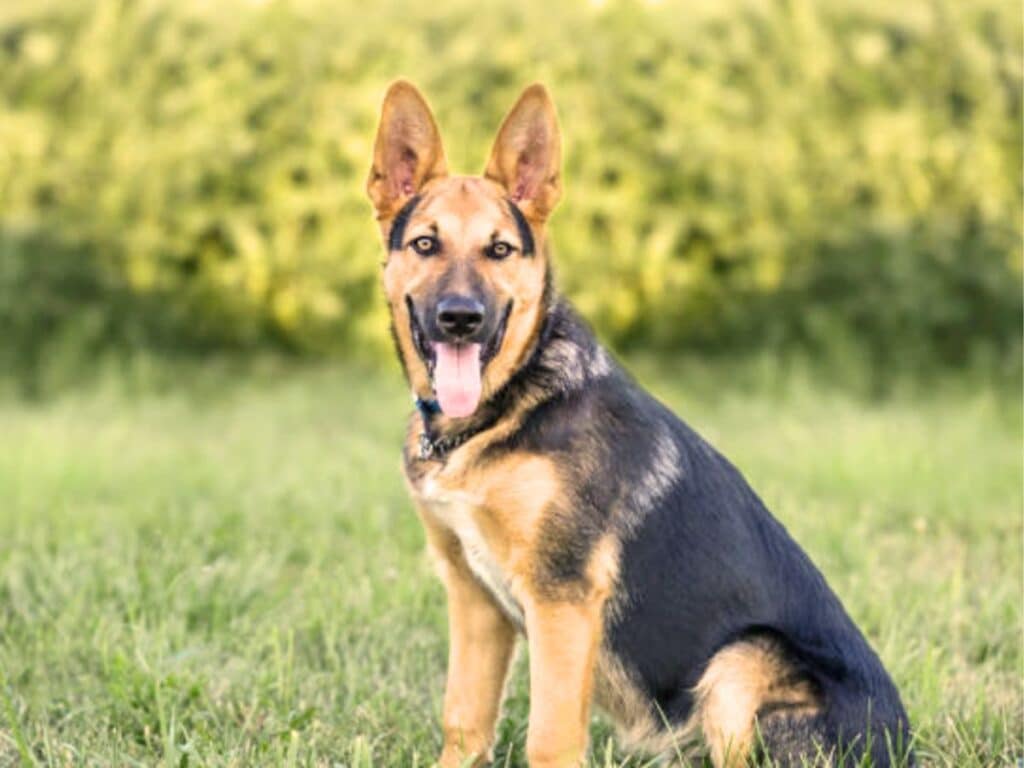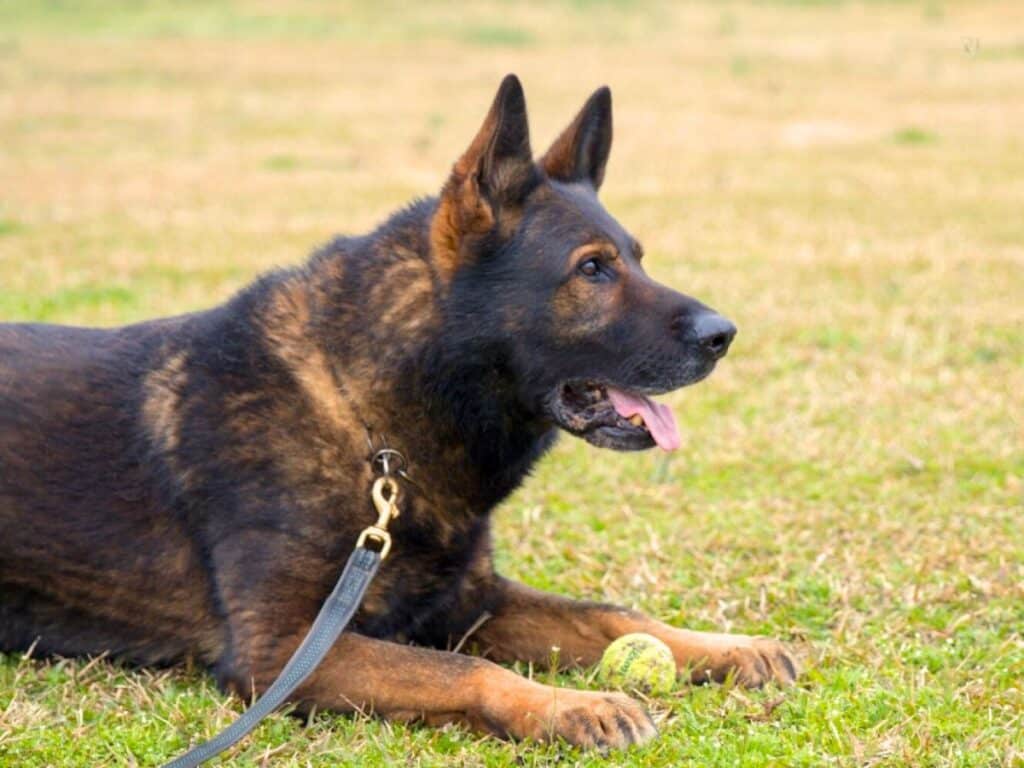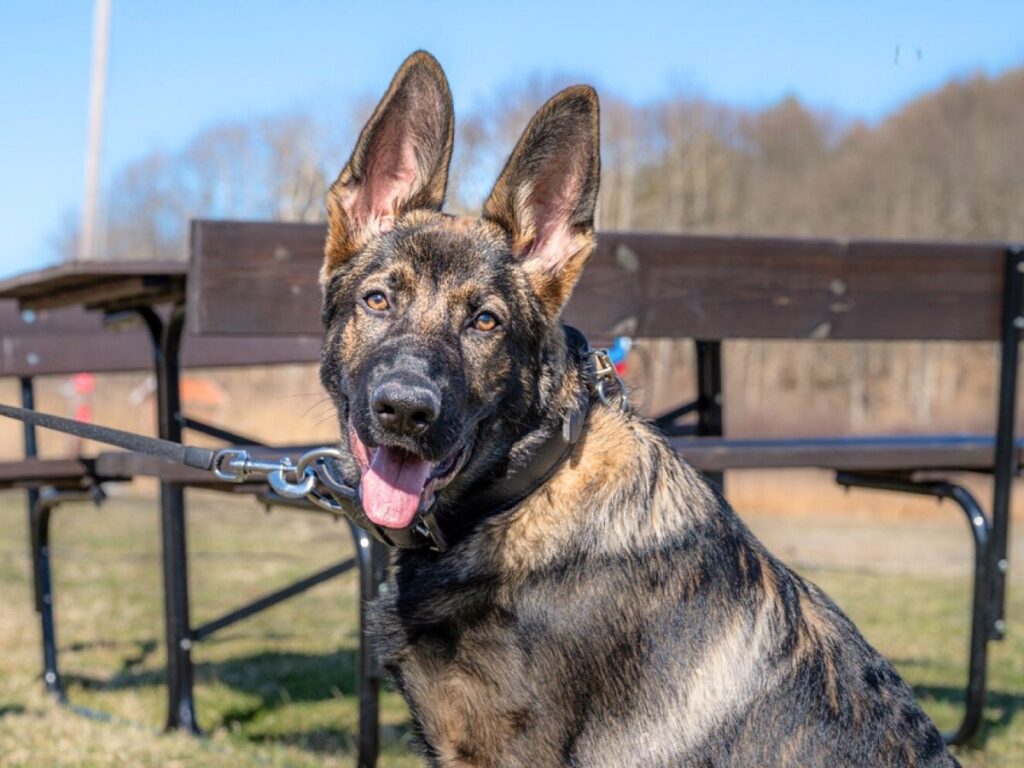If you own a 6-month-old German Shepherd, then you have a puppy that is already halfway through its first year of life.
At this age, your German Shepherd is highly energetic and requires plenty of exercise and playtime to keep them physically and mentally stimulated.
So, in this article, we’ll be discussing everything you need to know about caring for an almost adult GSD, from training tips, and nutrition to veterinary checkups.
6 Month Old German Shepherd Overview
The following table provides key details about a 6-month-old German Shepherd, offering insights into various aspects of their physical characteristics, health, behavior, and care requirements.
| Height | Male: 16 – 18 inches Female: 15 – 17 inches |
| Weight | Male: 49 – 57 pounds Female: 44 – 49 pounds |
| Coat | Double coat with a dense undercoat and medium-length outer coat |
| Health | Generally healthy; should have completed initial vaccinations and deworming |
| Diet | Eating a balanced puppy food, 3 meals a day |
| Exercise Needs | High energy levels; needs 30 minutes – 1 hour of exercise and playtime |
| Training | Basic obedience training; socialization is crucial at this age |
| Behavior | Playful, curious, may exhibit some teenage behavior; may start teething |
| Sleeping Patterns | Sleeping around 14-16 hours a day, including naps |
| Teething | Teething may be ongoing; provide appropriate chew toys |
How big is a 6 month old German Shepherd?
At 6 months of age, a male German Shepherd typically weighs between 49 – 57 pounds and stands approximately 16 – 18 inches tall at the shoulder. Females, on the other hand, are usually a bit lighter, ranging from 44 – 49 pounds, with a height of around 15 – 17 inches at the shoulder.
At this age, a German Shepherd puppy is still growing in height and weight, and developing rapidly.
This range will vary depending on genetics, diet, exercise routine, and overall health. Keep in mind that these numbers are just rough estimates, as every dog is unique and may not fit into the standard charts perfectly.
Proper nutrition and exercise are crucial in ensuring a German Shepherd reaches their ideal weight and height.
According to the American Veterinary Medical Association, overfeeding a German Shepherd can lead to obesity, joint problems, and other health issues later in life. It’s essential to feed them high-quality food that meets their nutritional needs without overfeeding them.

German Shepherd Growth Chart By Age
Here is a Growth Chart for you to track the development of your German Shepherd puppy.
The growth chart below outlines the expected weight and height ranges at different stages of a German Shepherd’s life, from puppyhood to adulthood.

RELATED
- German Shepherd Height & Weight Chart By Age
- 7-Month-Old German Shepherd: Everything You Need to Know
Coat of a 6 Month Old GSD Puppy
By the time your pup hits six months old, its furry coat is almost fully grown in, boasting those signature double layers that make them so lovable. But with great fluffiness comes great responsibility!
If you want to keep your home (and your clothes) free of fur, it’s time to develop a grooming routine. Invest in a high-quality undercoat rake and make sure to brush your pup at least once a week.
Not only will this help keep shedding under control, but it will also promote healthy skin and a shiny coat.
6 Month Old German Shepherd Behavior

At this age, your German Shepherd puppy will start to undergo some noticeable behavior changes. This is a crucial stage in their development, as they transition from being a young puppy to an adolescent dog.
While individual differences exist, here are some common behavioral traits and changes you may observe:
- Increased Independence: Around this age, puppies often start to show signs of independence. They may become more confident and explore their surroundings with greater curiosity.
- Teething and Chewing: Teething can be a significant factor at 6 months. The puppy may chew on objects to relieve discomfort. Providing appropriate chew toys can help redirect this behavior.
- Energy Levels: German Shepherds are known for their high energy levels, and at 6 months, your puppy will likely have bursts of energy. Regular exercise and playtime become even more crucial during this stage.
- Socialization: Your puppy may display a heightened interest in interacting with other dogs, people, and new environments. Positive social experiences at this age contribute to well-rounded adult behavior. (Source)
- Responsive to Training: This is an ideal time to reinforce basic obedience commands. The puppy may become more responsive to training, but consistency and positive reinforcement remain key.
- Increased Attention Span: The attention span of a 6-month-old German Shepherd may vary. While they can focus on tasks for a bit longer than when they were younger, patience is still required in training sessions.
- Testing Boundaries: As part of adolescence, you might notice your puppy testing boundaries. This is a normal phase in their development, and consistent training and positive reinforcement will help establish proper behavior.
- Guarding Instincts: German Shepherds naturally have protective instincts. At 6 months, you might observe a growing awareness of their territory, making them more alert to changes in their environment.
- Hormonal Changes: At this age, your male GSD puppy may start experiencing hormonal changes. This can result in increased territorial marking and mounting behavior. (Study)
In conclusion, the behavior changes in a 6-month-old GSD male puppy are a normal part of their development. Understanding and addressing these changes with patience, consistency, and proper training will help ensure a well-adjusted and happy adult dog.
RELATED:

Feeding Your 6 Month Old German Shepherd
At this stage, your puppy is growing rapidly and requires a balanced diet to support their development.
At 6 months old, they should be eating three meals per day at regular intervals throughout the day
Tips for Feeding Your Pup
- Choose a high-quality commercial dog food that is specifically formulated for large breed puppies. Look for brands that meet AAFCO standards and have animal protein as the main ingredient.
- Follow the feeding guidelines provided on the packaging, but keep in mind that individual dogs may have different needs. Monitor your puppy’s weight and adjust the portion size accordingly.
- Divide the daily recommended amount into multiple meals throughout the day to aid digestion and prevent bloating. Aim for three to four meals until your puppy is around 9 months old, then transition to two meals per day.
- Avoid overfeeding or free-feeding your German Shepherd. Obesity can lead to various health issues, including joint problems.
- Provide fresh water at all times and ensure your puppy stays hydrated, especially during hot weather or after physical activity.
- Avoid feeding your puppy table scraps or human food, as it can lead to digestive upset and nutritional imbalances.
- Consider incorporating treats into your puppy’s diet for training purposes, but be mindful of the calorie content and choose healthy options.
- Regularly monitor your puppy’s body condition and consult with your veterinarian if you have any concerns about their growth or dietary needs.
Feeding your pup requires careful consideration of their nutritional needs. By providing a balanced diet and following these tips, you can help support their growth and ensure they thrive into adulthood.
Remember, a healthy diet is just one aspect of overall care, so be sure to provide regular exercise, mental stimulation, and plenty of love and attention for your furry friend.
RELATED: Do German Shepherds Drink a Lot of Water?
How much should a 6-month-old German shepherd eat?
The amount of food to feed your 6-month-old German Shepherd can vary depending on their individual metabolism, activity level, and overall health.
As a general guideline, you can start by feeding them around 1.5 to 2 cups of puppy food per day, divided into three meals.
Each meal should consist of high-quality, commercial dog food specifically formulated for puppies.
It is important to choose a puppy food that is appropriate for large breed dogs, as German Shepherds are known for their size.
RELATED:

Training a 6 Month Old German Shepherd
Training a 6-month-old can be a rewarding but challenging experience. At this age, your German Shepherd is still a puppy but is also growing rapidly and developing their adult behaviors.
Here are some tips to help you effectively train your 6-month-old German Shepherd:
- Start with basic obedience training: Teaching your German Shepherd basic commands like sit, stay, come, and down is essential at this age. Use positive reinforcement techniques such as treats and praise to reward good behavior.
- Socialize your pup: Expose your puppy to different people, animals, and environments to help them develop good social skills. This will also help prevent behavior problems in the future.
- Leash training: Teach your German Shepherd to walk on a leash without pulling. Start with short walks and gradually increase the duration. Use positive reinforcement and rewards to encourage good leash manners.
- Be consistent: Be consistent with rules and commands. German Shepherds respond well to a clear hierarchy and consistent expectations. This helps them understand what is expected of them.
- Provide mental stimulation: German Shepherds are intelligent dogs that require mental stimulation to prevent boredom and destructive behavior. Use puzzle toys, interactive games, and obedience training sessions to keep their minds engaged.
- Redirect undesirable behavior: If your puppy exhibits undesirable behavior, redirect their attention to an appropriate activity. For example, if they start chewing on furniture, provide a chew toy as an alternative.
- Regular exercise: Ensure your puppy gets regular exercise to expend energy and stay physically fit. A tired dog is often more receptive to training.
- Seek professional help if needed: If you’re struggling with training your 6-month-old German Shepherd or encountering behavior issues that you’re unsure how to address, consider seeking help from a professional dog trainer or behaviorist.
Remember, patience and consistency are key when training a German Shepherd. With proper training and socialization, your puppy can grow into a well-behaved and obedient adult dog.
RELATED
Here’s a video about training a 6-month-old German Shepherd…
Exercising a 6 Month Old GSD
Regular exercise is crucial for a 6-month-old GSD’s physical and mental well-being. I have seen many pet owners neglecting their dog’s need for exercise, which can lead to various health problems.
A 6-month-old GSD needs at least 30 minutes to an hour of exercise daily to maintain good health.
Walking is the most basic form of exercise that you can do with your dog. It helps build endurance and strengthens muscles.
Running is another great way to get your 6-month-old GSD moving. However, it’s important to remember that puppies should not be over-exercised as it can lead to injury or exhaustion. Start with short runs and gradually increase the distance as your puppy grows older.
Playing fetch is also an excellent way to get your puppy moving while having fun at the same time. It’s important to use toys that are appropriate for your puppy’s age and size.
Training exercises that incorporate physical activity, such as obedience training, can also be beneficial for a 6-month-old GSD’s exercise routine.
However, before starting any new exercise routine for a 6-month-old GSD, it’s crucial to consult with a veterinarian first. They will assess your puppy’s overall health and make recommendations based on their individual needs.
It’s important to avoid over-exercising a 6-month-old GSD as they are still growing and developing physically. Over-exercising can cause damage to their joints and bones leading to long-term health problems later in life.
In addition to regular exercise routines, providing mental stimulation through interactive toys and puzzles can also help keep your 6-month-old GSD mentally stimulated and engaged.
These activities can include treat-dispensing toys, puzzle feeders, and interactive games.
RELATED: How Much Exercise Does a German Shepherd Need Per Day?

How much should a 6 month old German Shepherd Sleep?
A 6-month-old German Shepherd should sleep for about 14 to 16 hours a day. At this age, puppies are still growing and developing, so they require plenty of rest to support their physical and mental development.
It is important to provide a comfortable and quiet sleeping area for your German Shepherd puppy, where they can have uninterrupted sleep.
However, it is also essential to ensure they get enough exercise and mental stimulation during their waking hours to prevent them from becoming restless or bored.
If you notice any significant changes in your puppy’s sleeping habits or behavior, it is always a good idea to consult with a veterinarian for further guidance.
RELATED: How Many Hours Does A German Shepherd Sleep?

Conclusion
In conclusion, a German Shepherd that is six months old is energetic, curious, and requires a lot of attention and training to develop into a well-behaved adult dog. As they reach the halfway point between puppyhood and adulthood, they will experience significant physical and behavioral changes.
It’s important for owners to be aware of these changes and provide their German shepherd puppies with the necessary care and training to ensure a smooth transition into adulthood.
With patience, love, and proper care, your puppy will grow into a loyal and devoted companion.
Frequently Asked Questions (FAQs)
What is the average weight of a 6-month-old German Shepherd?
The average weight of a 6-month-old German Shepherd is between 49-57 pounds (22-25 kg) for males and 44-49 pounds (19-22 kg) for females.
How tall is a 6-month-old German Shepherd?
The height of a 6-month-old male German Shepherd reaches 16-18 inches (40-45 cm) at the withers, while females are 15-17 inches (38-43 cm) tall.
What kind of food should I feed my 6-month-old German Shepherd?
It is recommended to feed your 6-month-old German Shepherd a high-quality, balanced diet specifically formulated for large breed puppies.
How often should I brush my 6-month-old German Shepherd’s fur coat?
It is recommended to brush your 6-month-old German Shepherd’s fur coat at least once a week with a high-quality undercoat rake to prevent excessive shedding.
When does a 6-month-old German Shepherd finish teething?
A 6-month-old German Shepherd’s teething is almost completed, and they can normally show all 42 adult teeth. However, some puppies may continue teething until they are 7-8 months old.
Are 6 month old German Shepherds sexually mature?
While they may start to exhibit some signs of sexual maturity, such as mounting behavior or marking territory, they are not fully sexually mature at this age. The actual age at which a German Shepherd reaches sexual maturity can vary, but it typically occurs between 9 and 14 months old.




